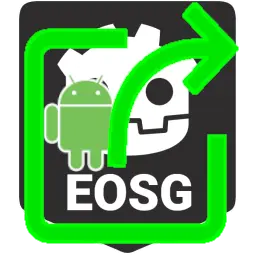Install Asset
Install via Godot
To maintain one source of truth, Godot Asset Library is just a mirror of the old asset library so you can download directly on Godot via the integrated asset library browser

Quick Information

Standalone plugin that automatically configures your Android build template for Epic Online Services. (EOSG)https://godotengine.org/asset-library/asset/2453
EOSG Android Export Helper
Standalone plugin that automatically configures your Android build template for Epic Online Services.
What's Included
plugin.gd- Main plugin registrationexport_plugin.gd- Export automation logicenv.gd- Environment variable loader (autoload singleton)eos_credentials.gd- Credentials wrapper class (autoload singleton)login.gd- Simple example login script using EOSCredentials.env.example- Template for your credentials file
Requirements
- Epic Online Services Godot plugin installed at
res://addons/epic-online-services-godot/ - Android build template installed (Project -> Install Android Build Template)
Quick Start Guide
1. Install the Plugin
Copy this plugin to res://addons/eos-android-export/ and enable it in:
Project -> Project Settings -> Plugins -> Enable "EOS Android Export Helper"
2. Configure Credentials
Copy .env.example to your project root as .env and fill in your EOS credentials:
# res://.env
PRODUCT_NAME=MyGameName
PRODUCT_VERSION=1.0.0
PRODUCT_ID=your_product_id
SANDBOX_ID=your_sandbox_id
DEPLOYMENT_ID=your_deployment_id
CLIENT_ID=your_client_id
CLIENT_SECRET=your_client_secret
Get your credentials from Epic Games Developer Portal
3. Setup Login
Add a Control node to your main scene and attach the script directly from the plugin:
res://addons/eos-android-export/login.gd
This will:
- Initialize EOS with your credentials from
.env - Login using DevAuth Tool (for development)
- Switch to anonymous login by uncommenting
_anonymous_login()in the script
4. Export for Android
Enable the Android build template:
Project -> Install Android Build Template
Then export normally:
Project -> Export -> Android
The plugin will automatically:
- ✅ Configure all Android build files for EOS (build.gradle, config.gradle, GodotApp.java)
- ✅ Include your
.envfile in the APK - ✅ Inject the EOS login protocol scheme using your CLIENT_ID
No manual configuration needed!
Client ID Priority
The plugin gets the Client ID from your .env file (CLIENT_ID=...). The EOSCredentials class automatically loads this value when accessed.
Advanced Usage
Using EOSCredentials in Your Code
The plugin adds EOSCredentials as an autoload, so you can access credentials anywhere:
# Get individual credentials
var client_id = EOSCredentials.CLIENT_ID
var product_id = EOSCredentials.PRODUCT_ID
# Validate all credentials are set
if EOSCredentials.validate():
print("All credentials configured!")
# Debug print (with secrets masked)
EOSCredentials.debug_print()
Using Env Helper
The Env autoload lets you read any variable from .env:
# Get custom variables from .env
var my_custom_value = Env.get_var("MY_CUSTOM_VAR", "default")
# Check if variable exists
if Env.has_var("DEBUG_MODE"):
print("Debug mode enabled")
Login Methods
The included login.gd shows two login methods:
DevAuth (Development)
- Requires DevAuth Tool running on
localhost:4545 - Get it from Epic Games Developer Portal
- Enabled by default in
login.gd
Anonymous (Production)
- No credentials required from user
- Creates a device-specific ID
- Uncomment
_anonymous_login()inlogin.gdto use
Customizing Login
You can modify login.gd directly in the plugin, copy it to your project for more control, or create your own:
extends Control
func _ready():
# All credentials automatically loaded from .env
var init_opts = EOS.Platform.InitializeOptions.new()
init_opts.product_name = EOSCredentials.PRODUCT_NAME
init_opts.product_version = EOSCredentials.PRODUCT_VERSION
# ... rest of your login code
Important Notes
Security: Add .env to your .gitignore to keep credentials private!
Android Export: The plugin only modifies build files during export. Your existing files are safe.
What It Does
- Adds EOS SDK dependencies to
build.gradle - Sets minimum SDK to 23 in
config.gradle - Injects EOS initialization code into
GodotApp.java - Configures OAuth login protocol scheme
Settings
eos_android/enable_auto_config- Enable/disable automatic configuration
Note
This plugin looks for the EOS plugin at res://addons/epic-online-services-godot/. If the EOS plugin is not found, the export will fail with an error message.
Plugin can be found here https://github.com/3ddelano/epic-online-services-godot
Standalone plugin that automatically configures your Android build template for Epic Online Services. (EOSG)
https://godotengine.org/asset-library/asset/2453
Reviews
Quick Information

Standalone plugin that automatically configures your Android build template for Epic Online Services. (EOSG)https://godotengine.org/asset-library/asset/2453

